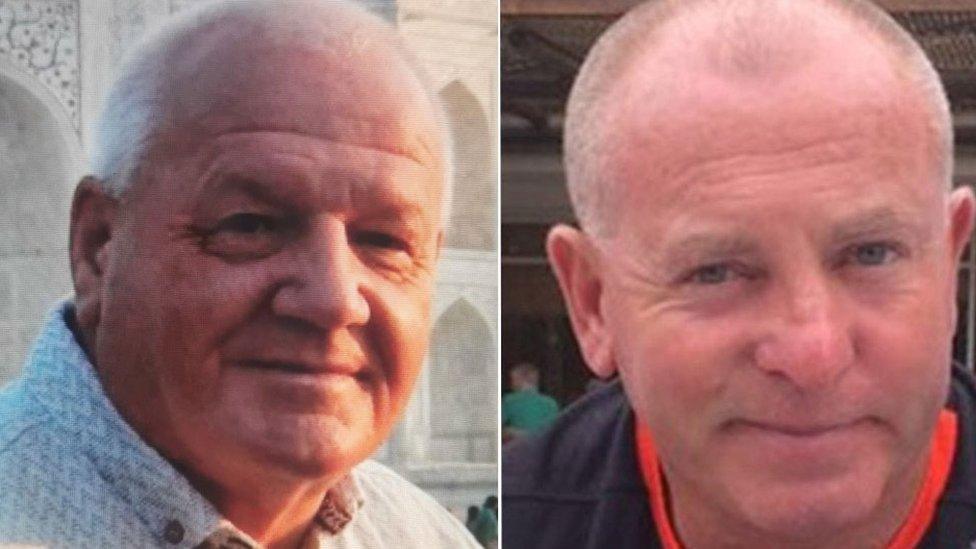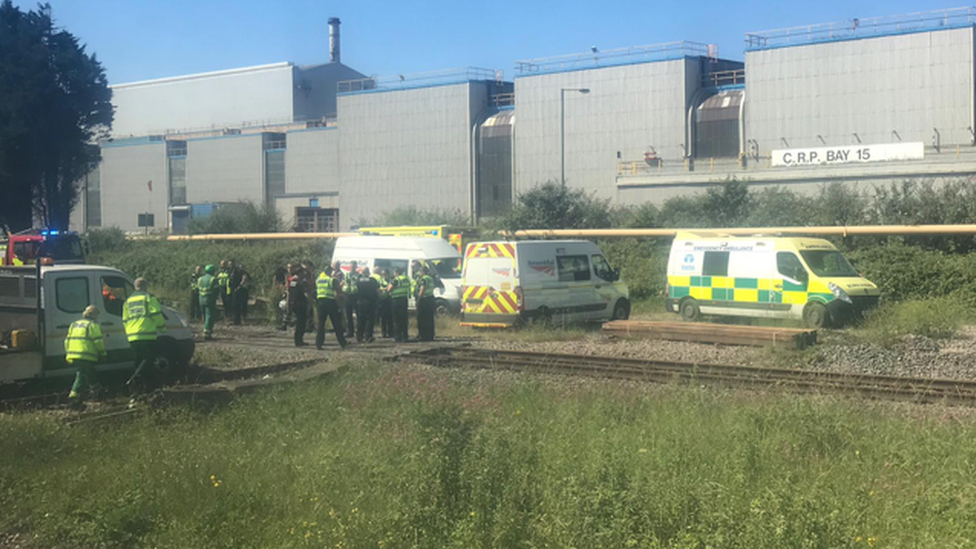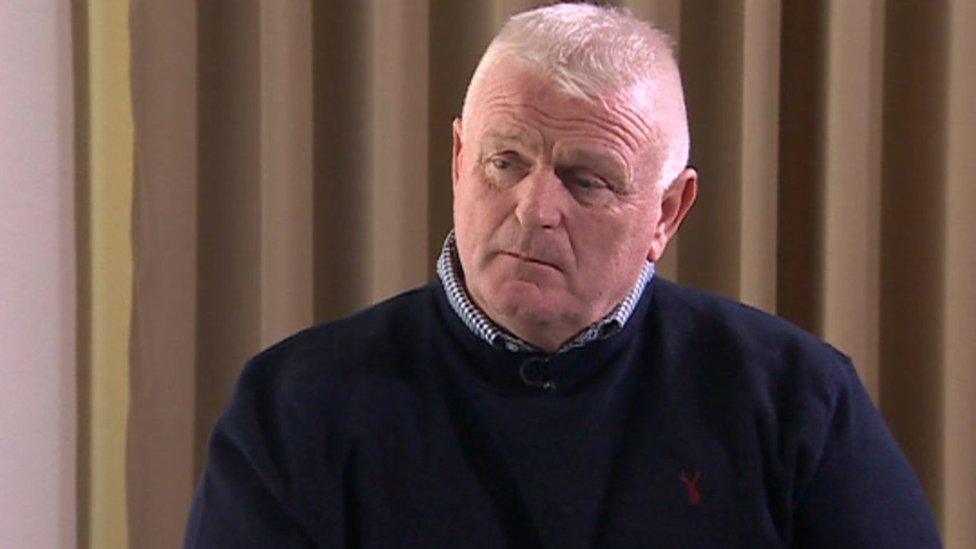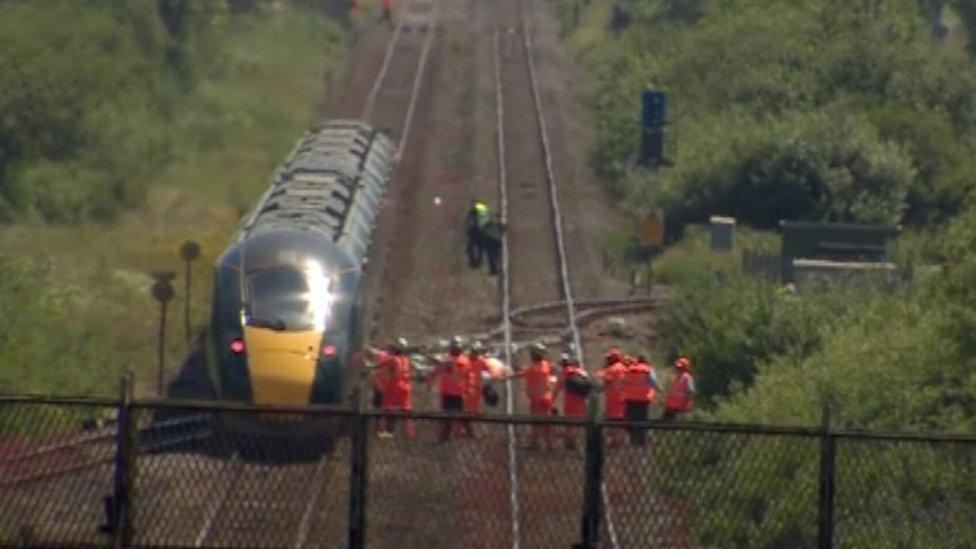Margam train deaths: Network Rail 'long-term safety failure' highlighted
- Published
Adrian Grant, Gareth Delbridge's nephew, said the report was "too little, too late"
Two workers were struck and killed by a train partly because of a long-term failure by Network Rail to improve track safety, an investigation found.
Gareth Delbridge, 64, and Michael Lewis, 58, were hit by a Swansea to Paddington train in July 2019.
The Rail Accidents Investigation Branch (RAIB) said they were part of a group of six carrying out maintenance work at Margam.
Network Rail said: "It should never have happened on our railway."
In its report, the RAIB said Network Rail's "long-term failure to improve the safety of people working on the railway" was an underlying factor in the deaths.

Gareth Delbridge (L) and Michael Lewis (R) were hit by a train in July 2019
A third worker also came "very close" to being hit while the group of six carried out maintenance work, it said.
"Over a period of many years, Network Rail had not adequately addressed the protection of track workers from moving trains," the report said.
"The major changes required to fully implement significant changes to the standard governing track worker safety were not effectively implemented across Network Rail's maintenance organisation."
It made 11 recommendations, nine aimed specifically at Network Rail - which cover safe work planning processes, developing safety behaviours among staff, and research into train horns automatically sounding when safety brakes are applied.
Network Rail's route director for Wales, Billy Kelly, said thoughts remained with the family of the men, adding the way it worked was "fundamentally changing".
"We've already halved the amount of work taking place while lines are open to traffic and are on course to dramatically reduce it further by 2022," he said.
"A safety task force, comprising of more than 100 people, has also been set up to further improve safety on the railway."

The men were hit and killed by the 09:29 service from Swansea to London Paddington
'A catalogue of errors'
Mr Delbridge's son-in-law, Adrian Grant, said the family were "devastated" but could take comfort that they can be part of "putting something right".
He said: "It is a real catalogue of errors. It's very antiquated and needs updating. It needs to be brought into the 21st Century.
"Even though the report goes into improvements and what network rail are trying to improve, for these two families it's too little too late.

Mr Grant said the report was a "catalogue of errors"
"Today both families are in shock because it brings everything flooding back but we can take a little bit of comfort from these findings.
"And we just hope our voices are heard and Network Rail follow through on the recommendations.
"We'll never have full closure. Families can be prepared for a family member who is ill or poor health but these guys just went to work, something they've done all their lives but they never came home."
'Time for clear thinking'
RAIB chief inspector of rail accidents Simon French said: "I remain hopeful that the rail industry will find a way to address these thorny and persistent issues.
"There is now a real sense that things must change. We've come a long way since the days when fatal accidents involving track workers were commonplace.
"However, it's now time for some clear thinking on how best to further reduce the risk to our colleagues."
There were no formally appointed lookouts at the site where them men were hit and killed, the report found.
"All three workers were almost certainly wearing ear defenders, because one of them was using a noisy power tool, and all had become focused on the task they were undertaking," it added.
"None of them was aware that the train was approaching until it was too late for them to move to a position of safety."

The men were hit and killed by the 09:29 service from Swansea to London Paddington
It also detailed how the driver made an "emergency application of the train's brakes" about nine seconds before the accident.
The train was travelling at about 50mph (80km/h) when it hit the track workers.
Planning paperwork indicated work was due to start at 12:30 to coincide with the planned blockage of the a line, but workers began at about 08:50.
The Office of Road and Rail, which regulates the rail industry's health and safety performance, said it would continue its own investigation while welcoming the report's findings.
Chief inspector of railways Ian Prosser said: "Track worker safety is paramount and in the 18 months prior to the incident at Margam we undertook additional inspections following our growing concerns that Network Rail was not doing enough to control risks to track workers.
"These inspections had resulted in formal enforcement action being taken. Network Rail responded by forming a significant task force to bring about much needed improvements."
Rail, Maritime and Transport union general secretary Mick Cash said: "All parties in the industry need to reflect on the implications of the report and strive to put track safety as a top priority and make the necessary changes with the aim of eliminating fatalities and serious injuries."
- Published5 December 2019
